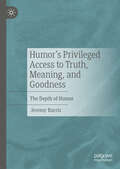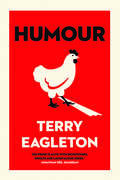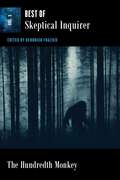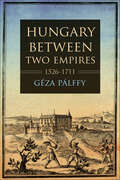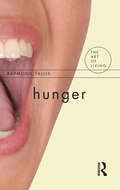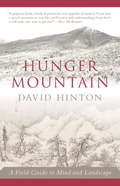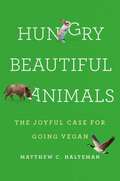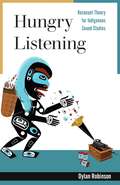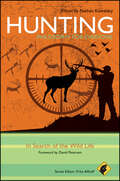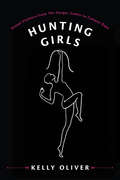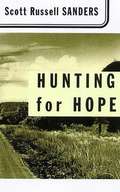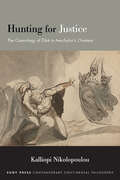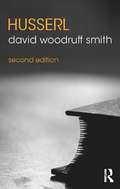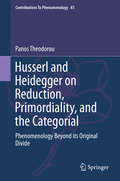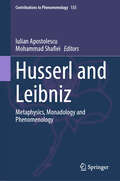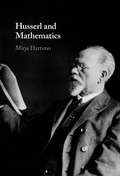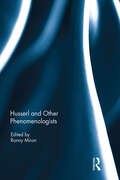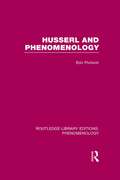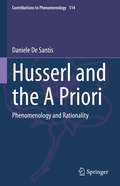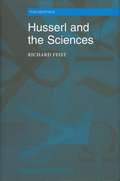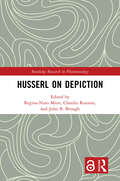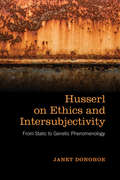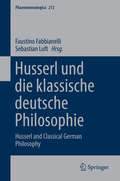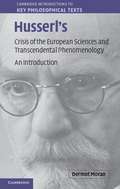- Table View
- List View
Humor’s Privileged Access to Truth, Meaning, and Goodness: The Depth of Humor
by Jeremy BarrisThis book explores three connected insights into humor. First, that humor provides a privileged access to the deepest kind of truth, the sense as such of its topics and so of their very reality. It is argued that humor allows us to see things afresh and truly by flouting the sense of the things it deals with so enabling us to step outside of our taken for granted immersion in that sense. As a result, the character of the true sense stands out against the contrast of its nonsensical distortion. Second, that because of the way humor accesses truth, it also brings out the essential meaning of relevant value including the good and the worthwhile. Third, humor enables a privileged coordination and negotiation of profoundly conflicting truths and values. Humor’s access to truth is privileged both in its depth, even with respect to metaphysics, and also because it establishes the truth of what it shows. Humor’s Privileged Access to Truth, Meaning, and Goodness is essential reading for all scholars and researchers of the philosophy of humor.
Humour
by Terry EagletonA compelling guide to the fundamental place of humour and comedy within Western culture—by one of its greatest exponents Written by an acknowledged master of comedy, this study reflects on the nature of humour and the functions it serves. Why do we laugh? What are we to make of the sheer variety of laughter, from braying and cackling to sniggering and chortling? Is humour subversive, or can it defuse dissent? Can we define wit? Packed with illuminating ideas and a good many excellent jokes, the book critically examines various well-known theories of humour, including the idea that it springs from incongruity and the view that it reflects a mildly sadistic form of superiority to others. Drawing on a wide range of literary and philosophical sources, Terry Eagleton moves from Aristotle and Aquinas to Hobbes, Freud, and Bakhtin, looking in particular at the psychoanalytical mechanisms underlying humour and its social and political evolution over the centuries.
Hundredth Monkey: Best of Skeptical Inquirer
by Kendrick FrazierThe Hundredth Monkey takes its title from philosopher Ron Amundson's expose of the "Hundredth Monkey Phenomenon," a claim about collective consciousness. Forty-three essays by thirty-nine authors, including Isaac Asimov, Martin Gardner, Carl Sagan, Ray Hyman, Paul Kurtz, and James Randi, examine aspects of paranormal and fringe-science beliefs from an authoritative, scientific point of view. The penetrating and entertaining essays, many with timely postscripts, are grouped into nine categories:- Understanding Human Need - Examining Popular Claims- Encouraging Critical Thinking - Medical Controversies- Evaluating the Anomalous Experience - Astrology- Considering Parapsychology - Crashed Saucer Claims- Controversies Within ScienceScientists and scholars discuss the burden of skepticism and the delicate balance between a creative openness to new ideas and the relentless scrutiny of new claims. A classic source book for scientifically responsible explanations of controversies, hoaxes, bizarre mysteries, and popular cultural myths.
Hungary between Two Empires 1526–1711 (Studies in Hungarian History)
by Géza Pálffy“A masterpiece . . . Pálffy illustrates the richness of Hungarian political, demographic, economic, and cultural developments.” ―Georg B. Michels, University of California, Hungarian Studies ReviewThe Hungarian defeat to the Ottoman army at the pivotal Battle of Mohács in 1526 led to the division of the Kingdom of Hungary into three parts, altering both the shape and the ethnic composition of Central Europe for centuries to come. Hungary thus became a battleground between the Ottoman and Habsburg empires.In this sweeping historical survey, Géza Pálffy takes readers through a crucial period of upheaval and revolution in Hungary, which had been the site of a flowering of economic, cultural, and intellectual progress—but battles with the Ottomans lead to over a century of war and devastation. Pálffy explores Hungary's role as both a borderland and a theater of war through the turn of the 18th century. In this way, Hungary became a crucially important field on which key debates over religion, government, law, and monarchy played out.Reflecting 25 years of archival research and presented here in English for the first time, Hungary Between Two Empires 1526–1711 offers a fresh and thorough exploration of this key moment in Hungarian history and, in turn, the creation of a modern Europe.“This is a history of divided Hungary for our global age. In lively and accessible fashion, and with the help of fresh research, much of it his own, Géza Pálffy shows how the Hungarian kingdom lacked the resources and coherence to remain an independent state after its devastating defeat in 1526.” ―Robert J. W. Evans, University of Oxford
Hunger (The Art of Living)
by Raymond TallisUnderstanding hunger is the key to understanding ourselves. While they seem the most obvious things about us, our hungers are also deeply mysterious, arising out of, and casting light on, the unique character of human consciousness. In humans, physiological need is transformed into a multitude of needs that are remote from organic necessity. Even first-level biological hunger is experienced differently in humans; and little in human feeding behaviour has any parallel in the animal kingdom.In this book, Ray Tallis takes us through the different levels of our hunger. Out of our primary appetites arise a myriad of pleasures and tastes that are elaborated in second-level hedonistic hungers creating new values. The evolution of appetite into desire opens the way to social hungers such as the hunger for acknowledgement. Awareness of death awakens a further level of hunger for something that lies beyond the pell-mell of successive experiences leading towards extinction. The art of living is the art of managing our hungers.
Hunger Mountain: A Field Guide to Mind and Landscape
by David HintonLearning to see with the eyes of the ancient Chinese sages can change your view of the universe, as David Hinton demonstrates. He takes us on a series of walks up Hunger Mountain, a wilderness area near his home in Vermont. What he sees and describes about these outings is informed by the cosmos-view he's imbibed from his many years of translating Chinese poetry: a way of looking at nature, and our place in it, and a particular way of regarding the relationship between ourselves and the universe. It's a view that informs all the great Chinese poetry and art. It's found in Taoism and Chinese expressions of Buddhism, but it predates them by millennia, going back probably to the Paleolithic Age--and it's found in the structures of the Chinese language itself, and in the evolution of the system of writing. Each chapter takes its name and theme from a character of the Chinese alphabet, whose history and development Hinton examines. They originate as primitive marks, very literally expressing the simplest of ideas, from which they grow and develop through time to express concepts of great subtlety. The poets and artists understood this and kept their focus on the emptiness that gives birth to all things as they used language and images that sprang from that emptiness. We learn about this as David walks up and around Hunger Mountain, making observations about the landscape, his place in it, and the underlying geological reality, telling stories of the great poets as he goes. It's the profoundest kind of nature writing, and it's an exceptionally accessible entrée to an ancient Chinese view of the universe.
Hungry Beautiful Animals: The Joyful Case for Going Vegan
by Matthew C. HaltemanA new approach to veganism "as a joyful celebration of life on this planet" (Bryant Terry) that is a "gateway into our Better" (Kathy Freston)—into a better life for us all Perhaps you&’ve looked at factory farming or climate change and thought, I should become a vegan. And like most people who think that, very probably you haven&’t. Why? Well, in our world, roast turkey emanates gratitude, steak confers virility, and chicken soup represents a mother&’s love. Against that, simply swapping meat for plants won&’t work. In Hungry Beautiful Animals, philosopher Matthew C. Halteman shows us how—despite all the forces arrayed against going vegan—we can create an abundant life for everyone without using animals for food. It might seem that moral rectitude or environmental judgement should do the trick, but they can&’t. Going vegan must be about flourishing, for all life. Shame and blame don&’t lead to flourishing. We must do it with joy instead. Hungry Beautiful Animals is more than philosophy: it&’s a book of action, of forgiveness, of love. Funny and wise, this book frees us joyfully to want what we already know we need.
Hungry Listening: Resonant Theory for Indigenous Sound Studies (Indigenous Americas)
by Dylan RobinsonWInner of the Best First Book from the Native American and Indigenous Studies Association Winner of the Labriola Center American Indian National Book Award Winner of the Ann Saddlemyer Award from the Canadian Association for Theatre ResearchReimagining how we understand and write about the Indigenous listening experienceHungry Listening is the first book to consider listening from both Indigenous and settler colonial perspectives. A critical response to what has been called the &“whiteness of sound studies,&” Dylan Robinson evaluates how decolonial practices of listening emerge from increasing awareness of our listening positionality. This, he argues, involves identifying habits of settler colonial perception and contending with settler colonialism&’s &“tin ear&” that renders silent the epistemic foundations of Indigenous song as history, law, and medicine. With case studies on Indigenous participation in classical music, musicals, and popular music, Hungry Listening examines structures of inclusion that reinforce Western musical values. Alongside this inquiry on the unmarked terms of inclusion in performing arts organizations and compositional practice, Hungry Listening offers examples of &“doing sovereignty&” in Indigenous performance art, museum exhibition, and gatherings that support an Indigenous listening resurgence.Throughout the book, Robinson shows how decolonial and resurgent forms of listening might be affirmed by writing otherwise about musical experience. Through event scores, dialogic improvisation, and forms of poetic response and refusal, he demands a reorientation toward the act of reading as a way of listening. Indigenous relationships to the life of song are here sustained in writing that finds resonance in the intersubjective experience between listener, sound, and space.
Hunting - Philosophy for Everyone: In Search of the Wild Life (Philosophy for Everyone #39)
by Fritz AllhoffHunting - Philosophy for Everyone presents a collection of readings from academics and non-academics alike that move beyond the ethical justification of hunting to investigate less traditional topics and offer fresh perspectives on why we hunt. The only recent book to explicitly examine the philosophical issues surrounding hunting Shatters many of the stereotypes about hunting, forcing us to rethink the topic Features contributions from a wide range of academic and non-academic sources, including both hunters and non-hunters
Hunting Girls: Sexual Violence from The Hunger Games to Campus Rape
by Kelly OliverKatniss Everdeen (The Hunger Games), Bella Swan (Twilight), Tris Prior (Divergent), and other strong and resourceful characters have decimated the fairytale archetype of the helpless girl waiting to be rescued. Giving as good as they get, these young women access reserves of aggression to liberate themselves—but who truly benefits? By meeting violence with violence, are women turning victimization into entertainment? Are they playing out old fantasies, institutionalizing their abuse?In Hunting Girls, Kelly Oliver examines popular culture's fixation on representing young women as predators and prey and the implication that violence—especially sexual violence—is an inevitable, perhaps even celebrated, part of a woman's maturity. In such films as Kick-Ass (2010), The Girl with the Dragon Tattoo (2011), and Maleficent (2014), power, control, and danger drive the story, but traditional relationships of care bind the narrative, and even the protagonist's love interest adds to her suffering. To underscore the threat of these depictions, Oliver locates their manifestation of violent sex in the growing prevalence of campus rape, the valorization of woman's lack of consent, and the new urgency to implement affirmative consent apps and policies.
Hunting for Hope: A Father's Journeys
by Scott Russell SandersIn a narrative threaded with the moving story of his father-son trip, Sanders sets out to accumulate his own reasons for hope. These richly examined medicine bundles of hope, Scott Russell Sanders brings all of his considerable powers as an elegant writer of prose.
Hunting for Justice: The Cosmology of Dike in Aeschylus’s Oresteia (SUNY series in Contemporary Continental Philosophy)
by Kalliopi NikolopoulouUtilizes Greek tragedy to investigate the fundamentally arbitrary and violent nature of justice.A purely political understanding of justice does not convey the cosmological origins of the ancient conception of justice, Dikē, in Aeschylus's Oresteia. Drawing from Walter Burkert's anthropology of the hunt in Homo Necans, which articulates an ancient cosmology and implies a theory of (tragic) seriousness that parallels Aristotle's naturalist interpretation of tragedy, Hunting for Justice argues that justice is rooted in predation as exemplified by the Furies. Although the Oresteia has been read as the passage from the violence of nature to civic justice, Kalliopi Nikolopoulou offers an original interpretation of the trilogy: the ending of the feud is less an instance of political deliberation (as Hegel maintained), and more an instance of nature's necessary halting of its own destructiven'ess for life to resume. Extending to contemporary contexts, she argues that nature's arbitrariness continues to underpin our notions of justice, albeit in a distorted form. In this sense, Hunting for Justice offers a critique of the political infinitization and idealization of justice that permeates our current discourses of activism and social justice.
Husserl (The Routledge Philosophers)
by David Woodruff SmithThis second edition of David Woodruff Smith’s stimulating introduction to Husserl has been fully updated and includes a new ninth chapter featuring contemporary issues confronting Husserl’s phenomenology. It introduces the whole of Edmund Husserl’s thought, demonstrating his influence on philosophy of mind and language, on ontology and epistemology, as well as ethical theory, and on philosophy of logic, mathematics, and science. Starting with an overview of Husserl’s life and works, and his place in twentieth-century philosophy and in Western philosophy as a whole, Smith introduces Husserl’s conception of phenomenology, explaining Husserl’s innovative theories of intentionality, objectivity, subjectivity, and intersubjectivity. In subsequent chapters Smith covers Husserl’s logic, metaphysics, realism and transcendental idealism, epistemology, and (meta)ethics. Finally, the author assesses the significance and implications of Husserl’s work for contemporary philosophy of mind and cognitive science. Also included is a timeline, glossary, and extensive suggestions for further reading, making Husserl, second edition, essential reading for anyone interested in phenomenology, twentieth-century philosophy, and the continuing influence of this eminent philosopher.
Husserl And The Promise Of Time: Subjectivity In Transcendental Phenomenology
by Nicolas De WarrenThis book is the first extensive treatment of Husserl's phenomenology of time-consciousness. Nicolas de Warren uses detailed analysis of texts by Husserl, some only recently published in German, to examine Husserl's treatment of time-consciousness and its significance for his conception of subjectivity. He traces the development of Husserl's thinking on the problem of time from Franz Brentano's descriptive psychology, and situates it in the framework of his transcendental project as a whole. Particular discussions include the significance of time-consciousness for other phenomenological themes: perceptual experience, the imagination, remembrance, self-consciousness, embodiment, and the consciousness of others. The result is an illuminating exploration of how and why Husserl considered the question of time-consciousness to be the most difficult, yet also the most central, of all the challenges facing his unique philosophical enterprise.
Husserl and Heidegger on Reduction, Primordiality, and the Categorial
by Panos TheodorouThis book deals with foundational issues in Phenomenology as they arise in the smoldering but tense dispute between Husserl and Heidegger, which culminates in the late 1920s. The work focuses on three key issues around which a constellation of other important problems revolves. More specifically, it elucidates the phenomenological method of the reductions, the identity and content of primordial givenness, and the meaning and character of categorial intuition. The text interrogates how Husserl and Heidegger understand these points, and clarifies the precise nature of their disagreements. The book thus sheds light on the meaning of intentionality and of its foundation on pre-objective time, on the sense of the phenomenological a priori, on intentional constitution, on the relatedness between intentionality and world, and on Heidegger's debt to Husserl's categorial intuition in formulating the question regarding Being/Nothing. The author revisits these fundamental issues in order to suggest a general intra-phenomenological settlement, and to do justice to the corresponding contributions of these two central figures in phenomenological philosophy. He also indicates a way of reconciling and interweaving some of their views in order to free Phenomenology from its inner divisions and limitations, enabling it to move forward. Phenomenology can re-examine itself, its obligations, and its possibilities, and this can be of benefit to contemporary philosophy, especially with regard to problems concerning consciousness, intentionality, experience, and human existence and praxis within a historical world in crisis. This book is ideally suited to students and scholars of Husserl and Heidegger, to philosophers of mind, consciousness and cognition, and to anyone with a serious interest in Phenomenology.
Husserl and Leibniz: Metaphysics, Monadology and Phenomenology (Contributions to Phenomenology #135)
by Mohammad Shafiei Iulian ApostolescuThis text explores how phenomenology might lead to monadological metaphysics, and conversely, how monadology might be helpful to nonmetaphysical thinking. Little has been published (especially in English) on the connections between these two fields and this edited volume is an invitation to assess the similarities and differences between Husserl’s philosophical projects and Leibniz’s metaphysics. Many Leibniz scholars have contributed to this volume. Phenomenologists covered include Stumpf, Brentano, Heidegger, Reinach, and Gurwitsch. This book appeals to scholars and advanced students working in the field.
Husserl and Mathematics
by Mirja HartimoHusserl and Mathematics explains the development of Husserl's phenomenological method in the context of his engagement in modern mathematics and its foundations. Drawing on his correspondence and other written sources, Mirja Hartimo details Husserl's knowledge of a wide range of perspectives on the foundations of mathematics, including those of Hilbert, Brouwer and Weyl, as well as his awareness of the new developments in the subject during the 1930s. Hartimo examines how Husserl's philosophical views responded to these changes, and offers a pluralistic and open-ended picture of Husserl's phenomenology of mathematics. Her study shows Husserl's phenomenology to be a method capable of both shedding light on and internally criticizing scientific practices and concepts.
Husserl and Other Phenomenologists
by Ronny MironHusserl and Other Phenomenologists addresses a fundamental question: what is it in the thinking of the founding father of phenomenology, Edmund Husserl (1859-1938), that on the one hand enables the huge variety in the phenomenological discourse and, at the same time, necessitates relying on his phenomenology as a point of departure and an object before which philosophizing is conducted. The contributors to this volume, each with his or her own focus on a specific figure in the phenomenological school vis-à-vis Husserl's thinking, demonstrate that every reference to Husserl is necessarily bound up with modifying his ideas and crossing the boundaries of his phenomenology. In this sense, and given the insight that Husserlian phenomenology is already imbued with the potential modifications and revisions, the post-Husserlian phenomenologies may be included together with Husserl in one so-called ‘Phenomenological Movement’. The discussions in the book open for philosophers and intellectuals a window upon phenomenology, which has been one of the richest and most influential cultural phenomena since its very appearance at the beginning of the twentieth century. The book also conveys the complex interpretive dynamic within which a given framework of ideas becomes a sort of magnetic field, with attracting and repelling forces acting on its participants, and thanks to which the great ideas of modernity maintain their vitality and relevance a hundred years after their first appearance. This book was originally published as a special issue of The European Legacy.
Husserl and Phenomenology (Routledge Library Editions: Phenomenology)
by Edo PivčevićSince its first publication in 1970 this book has become one of the most widely read introductory books on phenomenology and is used as a standard text in many universities from Germany to Korea and China. Praised for its accessibility and clarity the book has attracted a wide readership both within and outside the academia. Its author has over the years published a number of other books on Philosophy in which he has developed important theories of his own. This clear and elegant introduction traces Husserl’s philosophical development from his early preoccupation with numbers and his conflict with Frege to the transcendental phenomenology of his mature period. There is also a brief critical exposition of the views of Scheler, Heidegger, Sartre and other philosopher influenced by Husserl.
Husserl and the A Priori: Phenomenology and Rationality (Contributions to Phenomenology #114)
by Daniele De SantisThis book presents a systematic discussion of the development of Husserl’s concept of the a priori from his early and through his later writings. The chapters contained herein analyze the different phases and aspects of Husserl’s phenomenology of the a priori in light of his twofold notion of reason, construed as both ontological and transcendental. Starting from the assessment of the introduction of the notion of a priori knowledge in the context of the Logical Investigations, this text uniquely explores its development during the Göttingen years. It is at this time during his work on The Crisis of European Sciences, that Husserl comes to see the a priori as a criterion to interpret the history of philosophy, notably, modern philosophy. This book sheds light upon such concepts as: essence and eidos; ideation, eidetic attitude and eidetic reduction; as well as formal and material, innate and contingent a priori. The author argues that the a priori becomes for Husserl the expression of an ontological form of rationality, i.e., the rationality immanent to being. This book appeals to students and researchers working on Husserl and phenomenology.
Husserl and the Sciences: Selected Perspectives (Philosophica)
by Richard FeistEdmund Husserl (1859-1938) is one of the previous century's most important thinkers. Often regarded as the "Father of phenomenology," this collection of essays reveals that he is indeed much more than that. The breadth of Husserl's thought is considerable and much remains unexplored. An underlying theme of this volume is that Husserl is constantly returning to origins, revising his thought in the light of new knowledge offered by the sciences.
Husserl on Depiction (Routledge Research in Phenomenology)
by John B. Brough Regina-Nino Mion Claudio RozzoniThe publication of Husserliana XXIII “Phantasie, Bildbewusstsein, Erinnerung” in 1980 and John B. Brough’s translation of it in 2005 increased interest in Edmund Husserl’s philosophy of depiction. This volume is the first comprehensive book collection in English that provides a systematic reading of Husserl’s theory of depictive image consciousness.The book explains the meaning of various concepts in Husserl’s philosophy of depiction—such as Bildobjekt, Vergegenwärtigung, Perzeption — and examines the range and limits of the application of Husserl’s depictive image consciousness to various art practices and media, and to other mental acts, e.g., phantasy, memory. The book discusses, among other topics, empathy, symbolic presentation and the aesthetic experience of depictions. Additionally, the book compares Husserl’s theory of depiction with that of other philosophers, notably Franz Brentano, Jean-Paul Sartre, Maurice Merleau-Ponty, Roman Ingarden, Leopold Blaustein and Jean Baudrillard.Husserl on Depiction will be of interest to scholars and advanced students working in phenomenology, philosophy of perception, philosophy of art, aesthetics and pictorial representation.Chapter 3 of this book is freely available as a downloadable Open Access PDF at http://www.taylorfrancis.com under a Creative Commons Attribution-Non Commercial-No Derivatives (CC BY-NC-ND) 4.0 license.
Husserl on Ethics and Intersubjectivity: From Static to Genetic Phenomenology
by Janet DonohoeIn Husserl on Ethics and Intersubjectivity, Janet Donohoe offers a compelling look into Husserl’s shift from a "static" to a "genetic" approach in his analysis of consciousness. Rather than view consciousness as an abstract unity, Husserl began investigating consciousness by taking into account the individual’s lived experiences. Engaging critics from contemporary analytic schools to third-generation phenomenologists, Donohoe shows that they often do not do justice to the breadth of Husserl’s thoughts. In separate chapters Donohoe elucidates the relevance of Husserl’s later genetic phenomenology to his work on time consciousness, intersubjectivity, and ethical issues. This much-needed synthesis of Husserl’s methodologies will be of interest to Husserl scholars, phenomenologists, and philosophers from both Continental and analytic schools.
Husserl und die klassische deutsche Philosophie
by Faustino Fabbianelli Sebastian LuftDiese Aufsatzsammlung ist der erste ausführliche Versuch, eine Verbindung zwischen dem Denken der klassischen deutschen Philosophie und Husserls Phänomenologie herzustellen. Vorliegender Band versammelt eine Reihe neuer kritischer Artikel sowohl von etablierten Forschern wie jüngeren Philosophen aus beiden Traditionen, um diese Forschungslücke, als welche sie von beiderlei Forschungsrichtungen anerkannt ist, zu schließen. Dieser Band wirft neues Licht auf beide Traditionen und hebt ihre Bedeutung für die Philosophie der Gegenwart hervor, sowohl in historischer wie systematischer Hinsicht. Die in diesem Band behandelten Hauptthemen sind Erkenntnistheorie, Moralphilosophie und die Geschichte der Philosophie, wobei diese Themen auf der Basis von mehreren Subthemen (Objekt, Idealismus/Realismus, Subjektivität/Intersubjektivität, Ethik, Geschichte, Kultur) diskutiert werden. Hierdurch wird das grundsätzliche Koordinatensystem für einen spekulativen Vergleich zwischen Husserl und der klassischen deutschen Philosophie präsentiert, indem die wichtigsten Deutungslinien verfolgt werden, um sowohl die Kontinuität wie auch die Diskontinuität beider Traditionen wertschätzen zu können. Eine Sektion des Bandes ist insbesondere der Rezeption der Husserl'schen Phänomenologie und der klassischen deutschen Philosophie gewidmet. Die Aufsätze dieses Bandes sind für eine generelle philosophische Leserschaft intendiert mit besonderer Berücksichtigung von Forschern in den Gebieten der klassischen deutschen Philosophie (Kant, Fichte, Schelling, Hegel), des Neukantianismus und der phänomenologischen Tradition (insbesondere Husserl, aber ebenso andere wichtige Vertreter derselben).
Husserl'S Crisis of the European Sciences and Transcendental Phenomenology
by Dermot MoranThe Crisis of the European Sciences is Husserl's last and most influential book, written in Nazi Germany where he was discriminated against as a Jew. It incisively identifies the urgent moral and existential crises of the age and defends the relevance of philosophy at a time of both scientific progress and political barbarism. It is also a response to Heidegger, offering Husserl's own approach to the problems of human finitude, history and culture. The Crisis introduces Husserl's influential notion of the 'life-world' – the pre-given, familiar environment that includes both 'nature' and 'culture' – and offers the best introduction to his phenomenology as both method and philosophy. Dermot Moran's rich and accessible introduction to the Crisis explains its intellectual and political context, its philosophical motivations and the themes that characterize it. His book will be invaluable for students and scholars of Husserl's work and of phenomenology in general.
